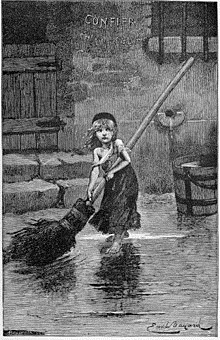Les Misérables, by Victor Hugo, is a French historical novel originally published in 1862. The novel has been widely regarded as one of the greatest works of literature of the 19th century and has since become a timeless classic across the world. Les Misérables has grown so popular in recent years as to even spawn a film adaptation (2012) as well as wildly popular musical theatre adaptations across the United States.
Despite centuries of critical acclaim, there was nothing I, a tenth grade boy with many obligations, wanted to do less than read hundreds of pages about old-timey French revolutionaries in a half-translated dialect I could barely understand. This ancient book, with its dull characters with increasingly confusing names, entire chapters of forgettable information, and convoluted, drag of a plot was just another chore to be checked off of my list. My responsibilities were already as numerous as they were cumbersome–Pre-Calculus alone had a workload great enough to occupy my free-time.
Like the rest of my classmates, I reluctantly accepted my thick, hard copy of this book which I was certain would be the end of me. The required reading went fast and was wholly unforgiving; there was no way to weasel out of reading this one. But, could I really bring myself to read this drivel? Would I even have the time?
As it turned out, I would not, in fact, have the time to read the ancient novel. As a result, it became merely a time filler. The half hour between practices, the few minutes between classes, the silent moments after a test–all extra time was put into trudging through the extensive pages of this so unexpectedly redeeming novel.
The story began abruptly and quite depressingly. With little-to-no explanation, you are following a man who has been instantly treated poorly everywhere he goes. After kindness is finally granted to him, he immediately betrays those who have helped him.
As a reader, this despair and general drabness was an immediate turnoff. In the midst of a busy and stressful time in my life, I am now having bitterness, hate, and despair shoved in my face. The depressing, confusion and slow plot persisted with without rhyme or reason, and subsequently soured my overall mood. How could such a mean spirited piece of work become such a cult classic, such a fan favorite, when all it accomplished was bringing me down?
As the story progressed, so did its clarity. Our main character was the honest man turned convict, turned honest man once more, Jean Valjean. I soon started to realize the truth: this novel and its characters only began so pitifully to serve as a comparison to what they were to become. This was not simply a dusty, old book about the misery of the French Revolution, but a novel of redemption and love for all people. Jean Valjean was not simply a character, but a symbol of hope for all in this world who have sinned (which is everyone, I promise). He exists to embody the internal struggle that everyone goes through at some point in their life; Valjean represents the perpetual struggle to do what is right, an ideal lost upon so many lately.
Following this epiphany, I found Jean Valjean with me often: Encouraging me to leave a larger tip for my waiter, urging me to refrain from cheating on my math test, even smiling upon me when holding the door for someone. I was obviously not thinking of Valjean specifically, but merely being made more conscious of my moral compass–for it seems morals are in short supply these days.
Overall, Les Misérables is a beautifully constructed novel that weaves an interesting and complicated tale about redemption and learning to love. It may be slowly paced, completely dull, and more than a bit of a downer, but this novel succeeds in delivering a message that my generation desperately needs to hear: The world is a bit rough around the edges, and it can only be made better through your own actions.
Success isn’t defined by the money in your pocket, the scores on your tests, or even the accomplishments you have achieved, but by the people you have helped, and good you have done for the world. Everyone could stand to learn a thing or two from the honest man, Jean Valjean.

[…] (If you want another student’s opinion I would recommend checking out this review.) […]